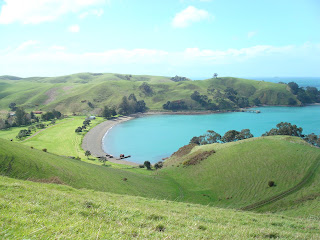We left EcoQuest at 7:15am on Sunday to drive to Auckland where we caught the ferry to Motutapu Island. The winds from the crazy storm here were whipping at our boat as we journeyed across the Hauraki Gulf to the Island. What a beautiful sight when we finally got to the island though, rolling hills of green and water as clear and blue as the Caribbean.
 |
| Motutapu Island |
|
|
|
|
|
Motutapu is an 160 million year old island. When Motutapu's island neighbor Rangitoto was born 600 years ago out of a volcanic eruption Motutapu was covered in rich volcanic ash which Maori took advantage of for cultivation. After a long occupation by Maori, Europeans added to the clearing of the island for dairy farming and other agriculture. During World War II the island was also used as a military base with a gun battery to prepare for attacks by the Japanese. Today, the island is a large restoration site. The plan is to restore 1/3 of the island to native forest to match up with some of the "remnant" forest that still exists from before Maori occupation! The plan is only for a third of the island because of the extensive archeological sites on that exist on the island which are both Maori and military based. Much of the land is also still used for pasture to farm for dairy and wool.
The reason for EcoQuest's visit was to help with the restoration project on the island. The restoration project is a volunteer based project that has been running for almost 15 years. Volunteers can come and plant new native trees, work in the nursery, or do some weeding. Our job on Sunday was to plant some new trees and other native plants to reestablish a native forest on the island.
 |
| The restoration site - you can see down at the bottom left some remnant forest, this is what our plants will grow up to be! |
|
 |
| One of my baby plants |
|
We and about 10 other volunteers planted 400 plants on Sunday! It was a great way to spend a Sunday knowing that our plants will someday grow into a beautiful native plant forest. A future home for many native animals since last year all pests were eradicated from the island, meaning they dropped poison onto the island to kill all the stotes, hedgehogs, and rats. It doesn't sound good but it's necessary in order for the native animals to thrive on the island - which is the whole point of restoring it. We spent the rest of the day sitting on the beach waiting for the ferry, eating gelato, and traveling home. A long day but a fulfilling one.
Our fourth week at EQ has started off great. Monday we had a half day so I had a very relaxing morning. This week we are focusing on restoration ecology, not surprising since our trip to Motutapu, doing another oral presentation, preparing for our first test, and writing a paper on what we did learned last week in Opoutere. School has begun at EQ!




what a great looking area does the water get warm enough in the summer to swim? it looks like it would be good snorkeling. get yourself in some of the pictures
ReplyDeleteDebbie says...What great pictures. My eyes were melting looking at the turquoise blue water and skies, and the lush green landscape. seems like great contributions are being made by you guys. Bravo!! Harrison says, Now I want to go there really bad.
ReplyDelete